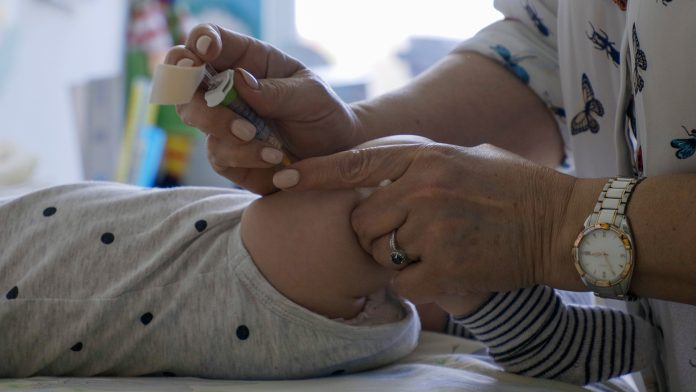
A new study has found that increasing children’s vaccines in sub-Saharan Africa could reduce the chance of fatal disease infection.
A research team from the University of Liverpool, UCL, the Malawi Ministry of Health and the Malawi Liverpool Wellcome Programme (MLW), has demonstrated that the current pneumococcal conjugate children’s vaccine schedule in Malawi which is also offered in many other low- and middle-income countries (LMICs), does not provide long-term immunity to children after the first year of life.
The findings can be found in The Lancet Infectious Diseases and highlight why a review of pneumococcal children’s vaccine strategies in countries across the world, to maintain vaccine-induced antibody levels and control the disease.
The importance of increasing children’s vaccines in LMICs
The World Health Organization (WHO) has estimated that over 300,000 children aged under five die of the pneumococcal disease every year, with children in LMICs carrying the greatest risk. Children’s vaccines must be proportionally administered in countries that need them most.
Professor Neil French, University of Liverpool, said: “This work underlines the need for vaccine policy decisions to consider alternative vaccine strategies, including a booster dose, to control the pneumococcal disease. Our findings are particularly relevant to researchers working to inform the introduction of new more cost-effective pneumococcal conjugate vaccines.”
The pneumonia vaccine protects against serious and potentially fatal pneumococcal infections, including pneumonia, blood poisoning (sepsis) and meningitis. This vaccine is offered routinely across the world to children aged under two years old.
Malawi introduced one pneumonia vaccine in 2011 using a three-primary dose children’s vaccine schedule, called 3+0. One dose is given at six, ten, and 14 weeks of age, with no booster given.
First author Dr Todd Swarthout, UCL Division of Infection & Immunity, said: “It is a pattern we see in other countries in Africa: vaccine coverage is high, but we see that PCV13 is less effective in reducing the occurrence of pneumococcal carriage and therefore diseases through herd immunity compared to high-income country settings.”
Declining antibody immunity
The researchers set out to understand why there was less impact in reducing pneumococcal carriage and therefore disease in Malawi and other LMICs, compared to what has been observed in most high-income country settings.
The team used sample data from an existing public health study that had been conducted in Malawi between 2016-2018 to gauge individual and population-level antibody immunity generated by the pneumococcal vaccine. The team analysed 638 blood samples for antibodies, present due to vaccination or past infection.
The results showed that despite high vaccine uptake, the 3+0 schedule had not led to sustained population-level antibody immunity after the first year of life.
Professor Robert Heyderman, UCL Division of Infection & Immunity, said: “After the first year of life, we saw post-vaccine antibody concentrations drop below the levels reportedly needed to adequately protect against the carriage and severe pneumococcal disease. This potentially contributes to the persistent carriage, transmission and invasive pneumococcal disease in Malawi and other similar settings.”
Designing improved vaccine strategies
The researchers call for policymakers to consider alternative children’s vaccine strategies, including schedule changes and a booster dose at one or two years old, to reduce the carriage and spread of disease.
The team are now evaluating the impact of a booster dose at nine months of age. The research will evaluate if it increases the duration of protective antibody concentrations compared to the 3+0 schedule.










